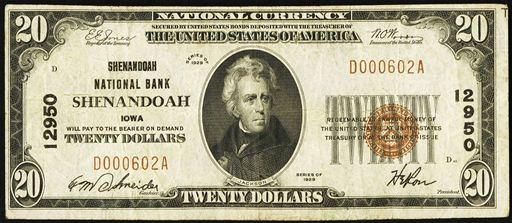The First National Bank Of Huntsville
The First National Bank Of Huntsville in Tennessee printed $89,440 dollars worth of national currency. A production number that low doesn’t save room for many survivors. Currency from this bank will be rare. This national bank opened in 1912 and stopped printing money in 1933, which equals a 22 year printing period. That is a fairly normal lifespan for a national bank. During its life, The First National Bank Of Huntsville issued 6 different types and denominations of national currency. We have examples of the types listed below. Your bank note should look similar. Just the bank name will be different. For the record, The First National Bank Of Huntsville was located in Scott County. It was assigned charter number 10192.
We buy all national currency. Please call or email us for a quote. Sales@AntiqueMoney.com
The First National Bank Of Huntsville in Tennessee issued 1,078 sheets of $5 1902 blue seal national bank notes. Most banks that printed such a small number of blue seal bank notes fall into the rare bank category. Ben Harrison is on the front of all 1902 $5 blue seal bank notes. This happens to be the smallest denomination issued for the 1902 series. Each note is complete with a blue seal and blue charter number. Despite saying series of 1902, these were actually issued by national banks between 1908 and 1928. There are two different types of blue seals. The first type is called a date back and it has “1902-1908” written on the back of the bill. The other type is called a plain back; it does not have the date stamps on the back of the bill. The values for these notes range widely based on condition and the bank of issue.
1902 $5 Blue Seal National Bank Note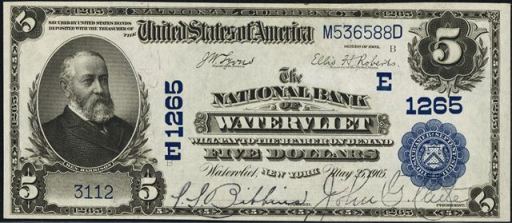
The First National Bank Of Huntsville printed 988 sheets of $10 1902 blue seal national bank notes. In the scheme of things that is a really tiny printing number. You are likely dealing with a true rarity. 1902 $10 blue seal bank notes all have a portrait of William McKinley on them. Values can range from as little as $40 up to over $10,000. There really is no trick to know what is rare and what is common by just doing an internet search. You really need to work with an expert (like us) in order to determine the value of your specific bank note. There are at least ten different factors than can make some 1902 $10 blue seals worth more than others. We know exactly what to look for and we would be happy to provide a free appraisal and our best offer.
1902 $10 Blue Seal National Bank Note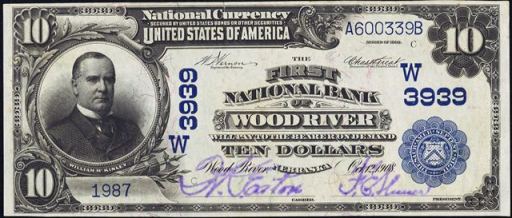
The First National Bank Of Huntsville also printed 988 sheets of $20 1902 blue seal national bank notes. The same rarity rules for 1902 $10 blue seals also apply to $20 blue seals. Just remember that $20 bills are by nature three times rarer (unfortunately they don’t command a premium over other denominations). Hugh McCulloch is pictured on the front of each bill. Contact us if you need pricing help.
1902 $20 Blue Seal National Bank Note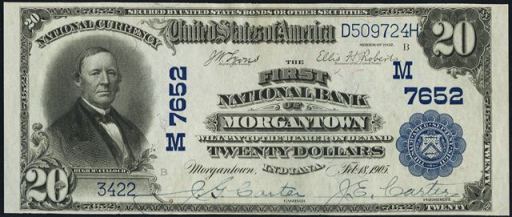
The First National Bank Of Huntsville also printed 282 sheets of Type1 1929 $5 national bank notes. That may sound like a very small number, and it is. However, when it comes to small size notes, that print range usually allows for a handful of survivors. Every 1929 $5 bill has a portrait of Abraham Lincoln on it. This is also the lowest denomination of small size national currency that any bank issued. All serial numbers end with the letter A and start with a letter between A and F. Remember that you can take the total number of sheets printed and multiply it by six get to the actual number of bank notes printed for this denomination. All small size national bank notes were printed on sheets of six.
Series of 1929 Type1 $5 National Bank Note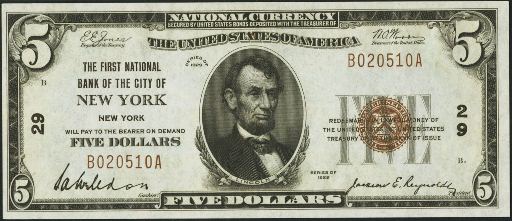
The First National Bank Of Huntsville also printed 119 sheets of Type1 1929 $10 national bank notes. That is an extremely small sheet printing number. Survivors are still likely but definitely not guaranteed. Each $10 bill from 1929 has a portrait of Alexander Hamilton on it. The black number written vertically is the charter number. The charter number never affects the value; it is just an identifier. The ten dollar type1 national bank note happens to be the single most common national bank note, with over 65,000 known to exist from all banks. Of course each note is valued based on its condition and rarity. Some are very rare.
Series of 1929 Type1 $10 National Bank Note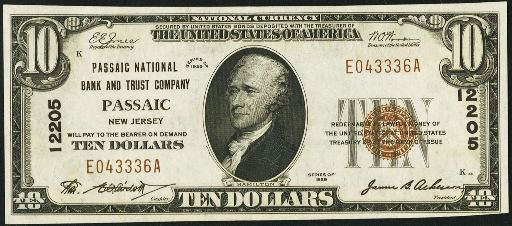
The First National Bank Of Huntsville also printed 24 sheets of Type1 1929 $20 national bank notes. That is an extremely small sheet printing number. Survivors are still likely but definitely not guaranteed. Andrew Jackson is featured on the front of each 1929 $20 bill. Be sure to take note of the serial number on your specific bank note. If it is 000001 then you can expect a nice premium. There is a special market for serial number one bank notes. Of course, even if the number isn’t #1, it could still be collectible and have a high value just based on its condition and rarity alone.
Series of 1929 Type1 $20 National Bank Note